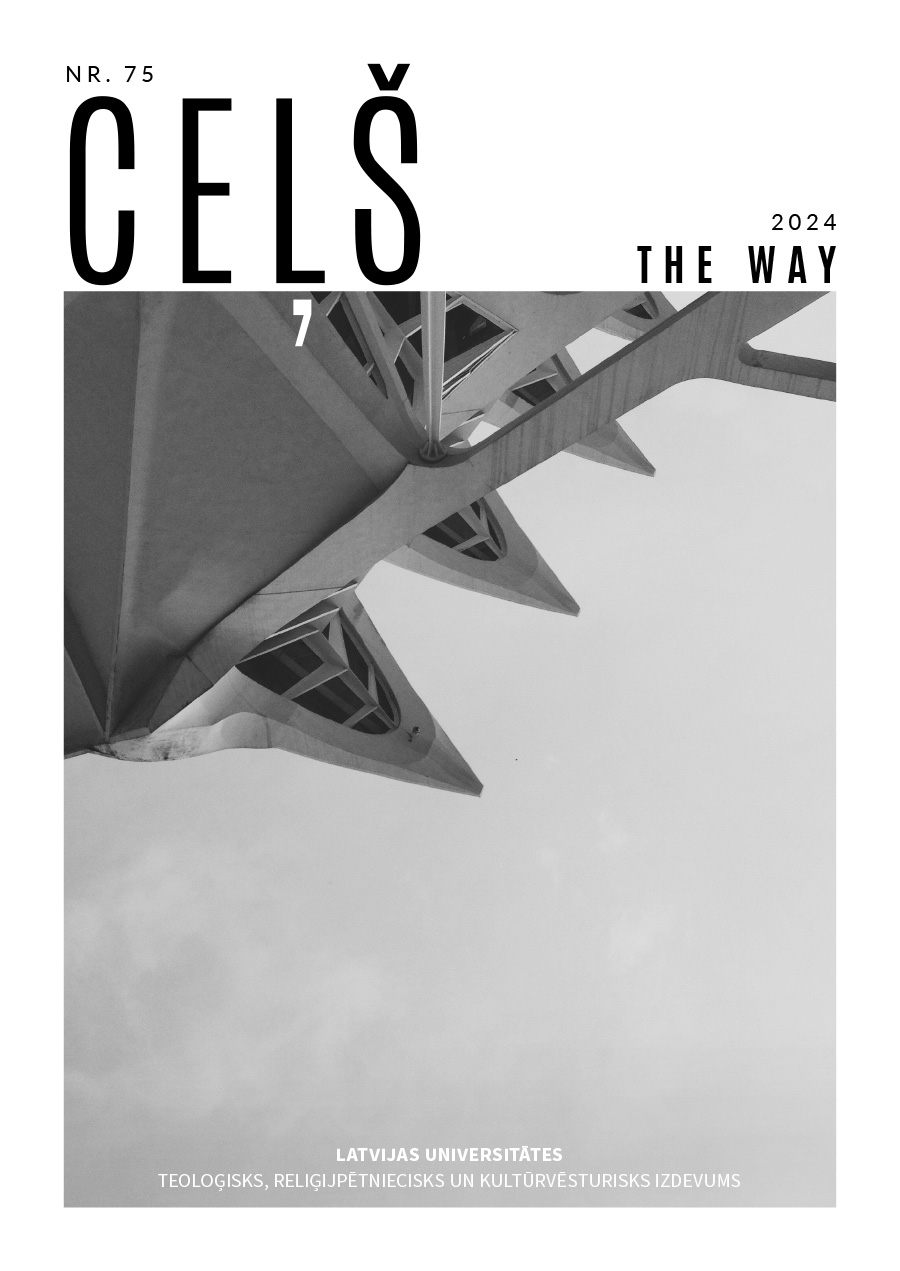Christian Motifs in Poetry of Fricis Bārda
DOI:
https://doi.org/10.22364/cl.75.04Keywords:
Fricis Bārda, dzeja, kristietība, filozofija, simbolismsAbstract
The creative work of Fricis Bārda suggests an intense spiritual search that eventually alienated him from Christianity. It is therefore sometimes contended that there is neither Christ nor Christian symbolism in his poetry. However, Christian motifs play a rather important role in Bārda’s poetry. They have been integrated in a wider context of synthesis of religious ideas.
Bārda’s first collection of poems “Zemes dēls” (“The Son of the Land”, 1911) contains few Christian motifs, and they appear as poetic expressions of other ideas. In the poem “Līgavainis” (“The Bridegroom”), the lyrical character’s cup of blood invokes parallels with the sacrifice of Christ’s blood, symbolising a man’s sacrifice for his Dream. The Dream embodies a spiritual reality, and its fulfilment can only be attained in death. In the poem “Tveice” (“Heat”), the Communion host is a poetic symbol of the physical and spiritual thirst of the ploughman. The poem “Lielā vienība” (“The Great Unity”) links Christian and Buddhist notions in an experience of spiritual enlightenment.
In the second collection of poems, “Dziesmas un lūgšanas Dzīvības kokam” (“Songs and Prayers to the Tree of Life”, 1923), there are more Christianity-related motifs. In the poem “Cīņa ar eņģeli” (“Wrestling with the Angel”), motifs of protest against the God’s established world order and the suffering inflicted on man are not directed against God himself, but in a euphemistic way against the guardian angel as a representative of the heavenly forces. The poem describes a collapse of the naïve faith of a child. The motif of the lost childhood faith is characteristic of Latvian classical poetry. The opening of the poem has several direct parallels with Aspazija’s poem “Aina” (“Scene”). In the following verses, the poet begins a resolute struggle for his lost childhood dreams. The poem contains many reminiscences of the Bible. The poem “Svešā dievnamā” (“In an Unfamiliar Church”) was written under the influence of the events of the First World War. It is the only poem directly portraying Christ. The description of a common man’s faith contains the Biblical notion that Christ turns his attention to “the smallest”. Bārda comes from a region that had an active movement of Moravian Brethren Congregations. The world-view inherent to Moravian Church, its yearning for purity of heart and a personal relationship with God have had an indirect influence on Bārda’s poetry. Motifs characteristic of the Moravian Church in the poem “Kad debesis atveras” (“When the Heaven Opens”) are combined with a generalised experience of enlightenment where one gains insight into spiritual truths that are not comprehensible to the mind. The motifs of the holiness of the Holy Communion and the earth as a harvest-giver are reinvented in the poem “Velēna” (“Turf”). The author affirms that he perceives a profound wisdom in the ancient words of the consecration of the Holy Communion. This suggests a greater openness to the Christian worldview at the end of the poet’s short life.
References
Roberts Feldmanis, Par sevi un sev. Autobiogrāfija un dzeja (Rīga: Profesora Roberta Feldmaņa fonds, 2017), 175.–176.
“Fricis Bārda – svešinieks savā laikmetā. Jaunromantisms. Fricis Bārda un Kārlis Skalbe”, Latvian Literatu-re Centre, https://www.literature.lv/his_lv/4_3.html (skatīts 25.11.2023.).
Kārlis Kraujiņš. “Friča Bārdas biogrāfija”, Kārlis Kārkliņš, Kārlis Kraujiņš, Fricis Bārda dzīvē un darbā (Rīga: A. Raņķa grāmatu tirgotavas apg., b. g. [1935.]), 140.
Fricis Bārda, “Domas par reliģiju”, Raksti, 1. sēj. (Rīga: Liesma, 1990), 363.–379., pirmpublicējums: Izglī-tības Ministrijas Mēnešraksts 10 (1920).
Zenta Mauriņa, “Pavasara dvēsele”, Burtnieks 4 (1929): 292.
Roberts Klaustiņš, Friča Bārdas daile un estētika (nobeigums), Ritums 8 (1924): 611.
Edgars Sūna, Fricis Bārda. Dzīve un dzejnieka persona. Sērija: Mūsu rakstnieki III. Rediģējis Kārlis Egle (Cēsis un Rīga: O. Jēpes izdevniecība, 1925), 64.
Eva Krekovičova, “Das barocke Bild “Tod als Braut” in der Folklore und die Wanderung eines Balladen-motivs”, Jahrbuch für Volksliedforschung 42 (1997): 89–97.
Kārlis Kārkliņš, “Friča Bārdas darbi”, Kārlis Kārkliņš, Kārlis Kraujiņš, Fricis Bārda dzīvē un darbā, 168.
Janīna Kursīte, Mītiskais folklorā, literatūrā, mākslā (Rīga: Zinātne, 1999), 299.
Ingus Barovskis, “Htoniskā pasaule latviešu folklorā: laiks un telpa” (disertācija, Latvijas Universitāte, 2015), 79.
Mitoloģijas enciklopēdija, Pasaules tautu mitoloģiskās būtnes un priekšstati, 1. sēj. (Rīga: Latvijas Encik-lopēdija, 1993), 181., 205.
Dziesmu grāmata latviešiem tēvzemē un svešumā (Pieksamaki: Latviešu Ev. Lut. baznīcas Amerikā ap-gāds, Latvijas Ev. Lut. baznīcas izdevniecība, 1992), 40.
Aspazija, Kopoti raksti, 1. sēj., 63.
Fricis Bārda, Raksti, 1. sēj., 137.
Fricis Bārda, Raksti, 1. sēj., 129.
Christopher Wells, “Pope at Audience: Wrestling with God a metaphor for prayer”, Vatican News (10.06.2020), https://www.vaticannews.va/en/pope/news/2020-06/pope-at-audience-wrestling-with-god-a-metaphor-for-prayer.html (skatīts 25.11.2023.).
Meyer, Mike, “Jacob Wrestles the man-God: An Embodied Reading of Genesis 32: 24-32” (dissertation, University of Auckland, 2021), 13–18. The University of Auckland. Libraries and Learning Services, https://researchspace.auckland.ac.nz/bitstream/handle/2292/58596/Meyer-2021-%20thesis.pdf?sequence=2&isAllowed=y (skatīts 25.11.2023.).
Fricis Bārda, Raksti, 2. sēj. (Rīga: Liesma, 1992), 262.
Pāvels Štolls, Latviešu kultūra un brāļu draudze. Latviešu kultūras tradīciju čehu konteksti XVII–XX gs. (Rīga: Mansards, 2016), 212.
Leons G. Taivans, Teoloģijas vēsture I (Rīga: Ceļš, 1995), 54.–55.
Kārlis Kundziņš, “Manas atmiņas par Frici Bārdu”, Ceļš. Gara dzīves mēnešraksts 5 (1946): 222.
Fricis Bārda, Raksti, 1. sēj., 15.
Fricis Bārda, Raksti, 1. sēj., 350.
Voldemārs Maldonis, Evaņģeliskā dogmatika (Rīga: Latvijas Universitāte, 1939), 296.
Downloads
Published
Issue
Section
License
Copyright (c) 2024 Ilona Miezīte, Latvijas Universitāte

This work is licensed under a Creative Commons Attribution-NonCommercial 4.0 International License.
Authors as copyright holders are named in each issue. Authors are allowed to publish under a Creative Commons License.


